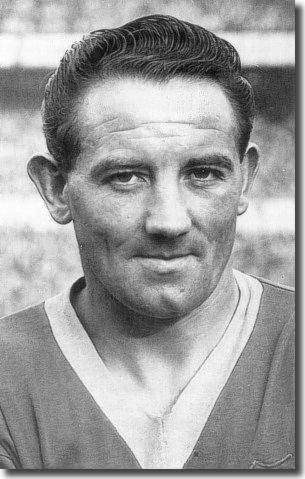 Relegation
is never a pleasant experience for anybody, but Leeds United manager Jack
Taylor found it particularly hard in 1960
when, within a year of him taking over at Elland Road, the club lost their
First Division status. He felt let down by the players and decided that
drastic action was called for if the club were to recover their top flight
status quickly.
Relegation
is never a pleasant experience for anybody, but Leeds United manager Jack
Taylor found it particularly hard in 1960
when, within a year of him taking over at Elland Road, the club lost their
First Division status. He felt let down by the players and decided that
drastic action was called for if the club were to recover their top flight
status quickly.
The youth development and scouting policy, which Taylor's predecessor
Bill Lambton had instituted, was
starting to bear fruit, and by the start of the new season almost 50 local
youngsters had been signed as amateurs. However, it was to be a couple
of years before any of them were good enough for first team contention
and in the meantime Taylor needed experienced new blood to pep up his
ailing side.
The club's supporters had little reason for optimism after the tepid
performances of the previous year, but the manager set about rebuilding
the side. He signalled a dramatic clear out: exciting young winger Chris
Crowe left for Blackburn in March, raising a useful £25,000, but that
was only the start. Before the new season had kicked off, Taylor had also
presided over the departure of Wilbur Cush, Archie Gibson, George Meek
and Jack Overfield. The Crowe money had been used to buy Manchester United
defender Freddie Goodwin, who had steadied things at the back, but it
had proven far too little far too late.
Bagchi and Rogerson in The Unforgiven: 'By the beginning of the
1960/61 season, the bank's apprehension had become palpable, and Taylor's
request to recruit a few reliable, experienced professionals had understandably
been rejected by the Board. The other alternative, to generate funds by
selling one or two players, was also denied him. Of the relegated squad,
only three players had any significant monetary value: Billy Bremner,
who was just seventeen and had only recently broken into the first team;
John McCole, scorer of 22 goals that season but widely perceived as a
functional penalty-box predator and little else, and who, anyway, would
be vital to Leeds' attempt to achieve promotion; and Jack
Charlton, whose inconsistency on the park and militancy off it put
off a whole host of suitors. There was to be no quick fix.'
However, Jack Charlton, who was frankly unconvinced of the merits of
a future at Elland Road, did not look to be a permanent resident at Elland
Road. Leo McKinstry: 'By mid-1960, Jack was so fed up with Leeds that
he wanted out. Other clubs learned of his disillusion and showed an interest
in buying him. One of them was Liverpool, where Bill Shankly had just
taken over as manager. Now Liverpool were hardly a major force in British
soccer at the time. They had been languishing in the Second Division for
even longer than Leeds, having been relegated in 1954, and were short
of class and cash. Nor was Shankly regarded then as a titan of management.
But Shankly was consumed with a passionate ambition for his new club.
Having seen Jack in action many times, he thought he could mould him into
the centre half he needed at the heart of his defence. But Leeds, for
all Jack's faults, were reluctant to sell him. So the fee quoted to Shankly
was £20,000 plus, which the Liverpool board thought was too high. According
to his biographer, Stephen Kelly, "Shankly reckoned Charlton was
worth every penny" of this fee, but his views did not wash with the
directors, who would allow him no more than £18,000 to be spent on Jack.
The strict limit meant that the negotiations went nowhere and the potential
deal collapsed, much to the annoyance of Shankly and Jack.'
Taylor recognised that he needed reinforcements, and set about making
the best of the limited resources he was able to scrape together. He raided
the Scottish League, picking up two rugged defensive half-backs in Eric
Smith of Celtic and Queen's Park's Willie
Bell, along with St Mirren centre-back John McGugan, who had been
in the Scottish squad which toured Europe that summer, and Queen of the
South winger Tommy Murray. Taylor also bought former England winger Colin
Grainger, known as 'The Singing Winger' for his vocal stints in night
clubs, for £15,000 from Sunderland and travelled to Holland to sign Irish
forward Peter Fitzgerald from Sparta Rotterdam.
Taylor had also started building a formidable backroom team and in the
close season secured the services of two men who would be major influences
at Elland Road for years to come - Les Cocker and Syd Owen.
Bagchi and Rogerson: 'Les Cocker, the former Stockport County and Accrington
Stanley forward, had learnt, like so many of his contemporaries, 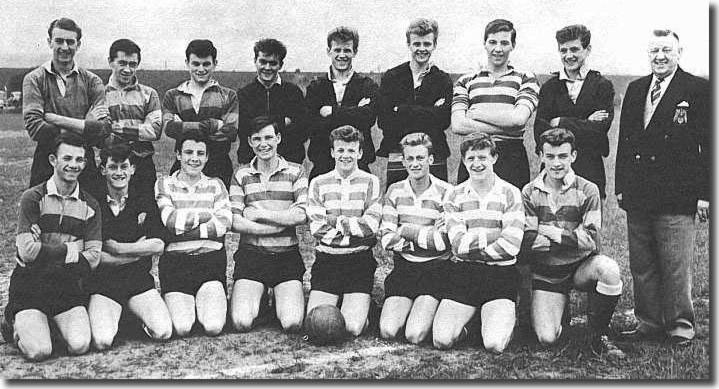 the
fundamentals of fitness in his wartime service with the Reconnaissance
Regiment in France after D-Day. He was temperamentally and professionally
qualified for the position of trainer. One of the first generation to
take the FA Coaching Certificate, he supplemented his tactical acumen
with exploratory studies in physiology and, more unusually, also dabbled
in the avant-garde sports sciences of kinesiology and biomechanics. He
had a stormy start with his new charges, who were contemptuous of his
dedication to their development, and had many a run-in with that self-styled
'one man awkward squad', Jack Charlton. Yet barely a year after joining
Leeds, he was summoned to Lancaster Gate and offered the prestigious job
of putting England squads through his revolutionary sequence of sadistic
drills, a position he was to occupy from 1966 right through to 1977.
the
fundamentals of fitness in his wartime service with the Reconnaissance
Regiment in France after D-Day. He was temperamentally and professionally
qualified for the position of trainer. One of the first generation to
take the FA Coaching Certificate, he supplemented his tactical acumen
with exploratory studies in physiology and, more unusually, also dabbled
in the avant-garde sports sciences of kinesiology and biomechanics. He
had a stormy start with his new charges, who were contemptuous of his
dedication to their development, and had many a run-in with that self-styled
'one man awkward squad', Jack Charlton. Yet barely a year after joining
Leeds, he was summoned to Lancaster Gate and offered the prestigious job
of putting England squads through his revolutionary sequence of sadistic
drills, a position he was to occupy from 1966 right through to 1977.
'For all his ructions with Charlton and the initial scepticism of the
other 'seen it all' seasoned pros, it was obvious that he was doing something
right. Fanatical and often abrasive, there was a touch of zealotry in
his soul. Indeed, in Brian Clough's characteristically brusque judgement
he was an 'aggressive, nasty little bugger'. 'Pots' and 'kettles' spring
to mind, but it was just these qualities that made Cocker so valuable.
His loyalty was unreserved and he brought structure, obstinacy and a certain
impassive relentlessness to his task, which was to become the cornerstone
of Leeds' physical authority.
back to top
'Cocker was rather more than the stereotypical 'sergeant-major' coach,
but there is little doubt that, more often than not, he played that role
to perfection. However, it was the more cerebral Owen who actually conducted
the technical sessions. A full England international, from 1941-46, he
had served in the RAF with distinction, on active service in Egypt, Austria
and Italy. Along with Cocker, he had joined Leeds from Luton Town in the
summer of 1960 to help Taylor's beleaguered team achieve promotion in
their first season back in the Second Division. Unlike Cocker, he had
a distinguished pedigree both as a player and a coach, and had actually,
briefly, been a manager himself. Having been sacked by Luton Town after
less than a year in charge, he was impatient in his desire to prove that
the progressive methods he had discovered at Lilleshall could be a success
as much on the field as on the blackboard. He, too, had problems imposing
his more modern philosophy on the conspicuously cynical Charlton, but
eventually, after one episode when Jack 'offered to take my coat off to
him', Charlton realised that he was rapidly beginning to unleash his dormant
potential under Owen's shrewd instruction.'
It was little short of a revolution and the Leeds supporters were shocked
by the sweeping changes after years of penny pinching by the board. Some
even began to half believe that Taylor could yet get their team winning
games.
The waters of optimism did not run deep, however. The first game of the
season saw Leeds United travel to face Liverpool at Anfield. Shankly's
up and coming charges had finished the previous season third in the table,
and were on an exciting march to better things - they provided a stern
challenge.
Taylor's team included Smith, Fitzgerald and Grainger, along with full
back Alf Jones, whom the manager had picked up from non-league Marine
in April. Charlton and 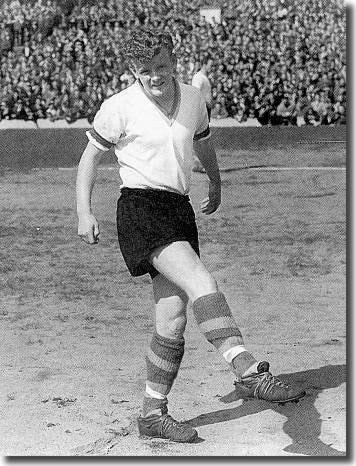 Goodwin
remained in the centre of defence, with Bremner and Revie in tandem on
the right and big John McCole leading the line.
Goodwin
remained in the centre of defence, with Bremner and Revie in tandem on
the right and big John McCole leading the line.
Over 43,000 fans flocked to Anfield to see Leeds well beaten and lucky
to depart with only a 2-0 defeat.
Taylor rang the changes for the second game, four days later at home
to Bristol Rovers, with Grenville Hair, South African winger Gerry Francis
and Irishman Noel Peyton coming in for Jimmy Ashall, Bremner and Fitzgerald,
but there was little improvement. Leeds drew 1-1 in front of just 11,330
fans, with McCole scoring the goal.
The next game, against Rotherham, brought further changes, with Scottish
inside forward Bobby Cameron and 18 year old local boy John Hawksby replacing
Smith and Revie. The match was Hawksby's first and he marked it with the
opening goal, while McCole weighed in to produce a 2-0 scoreline. Hawksby
scored the first Leeds goal the following game, too, as Taylor kept faith
with a winning side. Grainger, Peyton and McCole were the other scorers
as Leeds drew 4-4 in the return against Bristol Rovers.
Yet another switch came in the next match, with Tommy Murray getting
his chance in place of Hawksby for a trip to Southampton. Leeds won 4-2
with goals from Grainger, Cameron, Francis and McCole, but the continual
changes made it impossible for the team to find any shape or rhythm. Taylor
seemed incapable of settling on his most effective line up, although injuries
and poor form left him few alternatives but to fiddle while Rome smouldered.
In an unwitting glimpse into the near future, Leeds swapped their standard
kit of blue shirts, white shorts and blue and gold socks for an all white
strip, trimmed with blue and gold, for the home game against Middlesbrough
on 17 September. The match finished in a spectacular 4-4 draw, but the
normal club colours were quickly restored.
That match somehow encapsulated the whole season for Taylor and his men.
The manager's continual chopping and changing brought no solutions, just
uncertainty and inconsistency. Sloppy defending had seen Leeds concede
92 goals in 1959-60. Relegation brought no respite and Second Division
forwards gorged themselves, with the three keepers that Taylor used, Ted
Burgin, and the youngsters Alan Humphreys and Terry Carling, picking the
ball out of their vulnerable net 83 times.
Bagchi and Rogerson: 'Among those stationed in front of the novice goalkeeper,
Freddie Goodwin, had joined Leeds to reignite a stalled career over the
Pennines at Manchester United. A former "Busby Babe", he had
shone intermittently at Old Trafford after graduating into the first team
in the aftermath of the Munich disaster but could never quite convince
Matt Busby that he had sufficient class to prosper at the highest level.
Originally a midfielder, he was converted to centre-half in the hope of
capitalising on his perceived versatility.
'Chronically one-paced and over-reliant on his brute strength, he nevertheless
had much to offer a struggling side. Good in the air and blessed with
natural authority … unfortunately, in contradiction to all his other admirable
leadership qualities, he lacked composure. His method was redolent of
the 'get some blood on your boots' approach loved by fans, but it failed
to mask his technical flaws.
'Managers love forceful characters and are willing to excuse many defects
if effort is always shown - but it can have its downsides. Goodwin managed
to persuade Taylor that Leeds should adopt a man-to-man marking system.
It enabled Goodwin to exploit his powerful tackling style, but other players
were run ragged tracking attackers all over the park. Charlton hated it
but reluctantly deferred to his senior colleague.'
back to top
In sharp contrast to the shaky rearguard, the United attack, spearheaded
by John McCole, did well. McCole carried on where he left off in the previous
season, scoring 20 goals in the League, following on from 22 the year
before. He also provided a good return in a new competition, the Football
League Cup, the brainchild of League secretary
Alan Hardaker. It was to be several years before the public embraced
the competition, but Leeds enjoyed some good performances in the trophy's
debut season.
Don Revie scored the club's first goal in the competition, hitting the
first in a 3-1 replay success at Blackpool, with McCole and Grainger finishing
the job. A 4-0 win at Chesterfield followed and United hit four again
in the next round, at Southampton, but still lost in one of the most remarkable
games in the club's history.
The Saints stormed into a 4-0 lead with Derek Reeves scoring all four
goals. Leeds showed uncharacteristic spirit by pulling level with goals
from Noel Peyton, McCole, Jack Charlton and a Bobby Cameron penalty. But
with 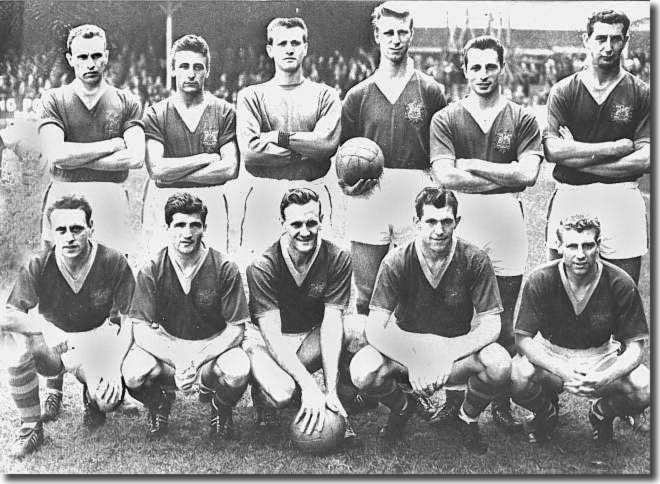 just
25 seconds remaining Reeves crowned a personal triumph by netting his
fifth in an amazing game which went on until 10.10pm because of two floodlight
failures, making it the longest-ever match in England.
just
25 seconds remaining Reeves crowned a personal triumph by netting his
fifth in an amazing game which went on until 10.10pm because of two floodlight
failures, making it the longest-ever match in England.
Both teams finished the match a man short. Southampton goalkeeper Ron
Reynolds had gone off while United full back Alf Jones, who had only recently
regained his first team place from Terry Caldwell, was withdrawn following
a knee injury.
Matters continued in a haphazard way all season, with Taylor's indecision
and a bad run of injuries prompting the use of 27 different players.
Concentration and professionalism were sadly lacking, with much of the
blame laid at the doors of the manager. Eric Smith was appalled by what
he found when he arrived from Celtic: 'The club was fifth rate and the
players were undisciplined. It wasn't their fault. Jack Taylor had let
the thing go. I thought beforehand I was coming to a top club. I found
out otherwise in the first three or four days. We would go on long training
runs and at the end, some players, quite senior players, would walk in
with ice lollies in their hands.'
The problem was not that Leeds were doing particularly badly. Indeed,
although they dipped at times into the very lowest reaches of the table,
they never looked in serious danger of a second successive relegation.
However, for a team which had been in the top flight so recently, they
contrived to look very mediocre indeed, against even the most limited
opposition. There was an air of despondency and resignation around Elland
Road, with team spirit virtually non existent and discipline in shreds.
Apathy set in amongst the fans, and gates dwindled significantly. Only
the presence of the bigger sides could generate any interest and the average
home gate was below 14,000, lower than it had been at any time since the
very first steps of Leeds United as a Second Division club in the 1920's.
Many matches saw less than 10,000 hardy souls braving the elements in
search of what little entertainment could be had at Elland Road.
In fact, the only party who seemed to give a damn were the shareholders,
dismayed at seeing the value of their 'investments' plummeting. An extraordinary
general meeting was forced in December 1960 amid demands for a vote of
confidence in the board. The arguments were long and passionate, but in
the end a declaration of support was carried by a poll of seven to one.
However, the unrest was acknowledged and changes were afoot. Harry Reynolds,
a board member since 1955, became increasingly dominant behind the scenes.
He eventually went on to succeed chairman Sam Bolton, who was becoming
weary at having to lead the club through such desperate times. Reynolds
was an eccentric self-made millionaire who continued to live in a two-up,
two-down terraced house despite having made a fortune as a steel stockholder
after starting out in life as a railway cleaner and fireman. He was born
in Holbeck, just a few minutes' distance from Elland Road, and was a lifelong
Leeds fan, nurturing a vision of the club as a leading power in the land.
The boardroom revolt coincided with a brief revival in the club's results
on the field and they went through December and January undefeated in the league, winning five of their eight games and climbing to ninth
in the table from a lowly fifteenth spot.
in the league, winning five of their eight games and climbing to ninth
in the table from a lowly fifteenth spot.
But, just as it seemed the team's fortunes were looking up, those of
Don Revie were in sharp decline.
His appearances all season had been sporadic as his form and confidence
suffered, and he chose to surrender the captaincy, arguing that the fates
did not smile on his leadership. Freddie Goodwin took on the responsibility
but enjoyed no better luck with either consistent team selections or results.
Revie played his final game of the season in a 3-0 win at home to Southampton
on January 14 as his thoughts turned to the future and a potential move
into management.
Revie kept his ambitions largely to himself, although Taylor relied on
his experience and capacity to evaluate a player. The manager one day
invited both Reynolds and Revie to travel with him to look at a player
in Bolton. On the trip, Reynolds spoke of his hopes for the club. His
views on the way forward coincided in many respects with Revie's ideas
about the game, and a bon of mutual respect was forged between them.
The prospect of Revie's departure was not a matter of great concern to
the club. At thirty-one the former England international was already past
his best when he joined from Sunderland in November 1958. Anxious to secure
a player-manager's job as his on-field career drew to a close, he had
applied for the job at Bournemouth in February 1961. Chester City and
Tranmere Rovers were interested in him and Adamanstown from Australia
held out the promise of a five year contract as player-coach.
back to top
However, events for Revie and Leeds United were soon to take a startling
turn.
The team's strong form around the turn of the year had proven to be a
mere flash in the pan and all the old failings came flooding back in February.
Four straight defeats and 13 goals conceded were enough - the new board
met behind closed doors to discuss the situation and Harry Reynolds pressed
for change. Jack Taylor had the final twelve months of his three year
contract still to run, and the miserly board were apprehensive about paying
out the £2,500 it would take to terminate his contract. Reynolds decided
to push the issue and met Taylor to tell him of the board's concern, hinting
that he would be pressing for the manager's dismissal.
Leeds managed to beat Norwich 1-0 at Elland Road on 11 March to end their
losing run, but Taylor had had enough and decided to call it a day, resigning
a couple of days later, despite his team being in a comfortable ninth
spot. There were no protests and the story merited few newspaper headlines.
Even the local paper, the Yorkshire Evening News, contained only
a fleeting report that club secretary Cyril Williamson would assume managerial
responsibilities pending the appointment of a successor. Sam Bolton admitted
to being more concerned with arrangements for that week's FA Cup semi-final
between Leicester City and Sheffield United, to be staged at Elland Road.
'We have not yet had time to consider an official appointment,' a stressed
Bolton said. 'We shall give the matter plenty of thought in the near future.'
However, Ronald Crowther, the editor of the paper and a long time supporter
of the club, played a part in resolving the issue. Crowther had already
written angrily in condemnation of the directors, 'It will not surprise
me if United carry on with a secretary-manager - Mr Williamson - at the
helm, with chief coach Syd Owen responsible to him for team affairs.'
Revealing the insecurity that would always haunt him, Don Revie asked
Crowther to draft his letter of application for the Bournemouth post.
Crowther instead pressed Revie to apply for the Leeds job.
It is the stuff of legend that Revie asked Reynolds for a reference.
The director wrote the letter, recommending Revie in glowing terms, but
paused as he did so and, considering his man's qualities, decided to rip
up the letter and exploit the potential himself. He managed to persuade
his fellow directors to give Revie the opportunity to begin his management
career in West Yorkshire, although when Leeds told Bournemouth that it
would cost them £6,000 to sign Revie, the South Coast club were given
considerable food for thought. The Times celebrated the historic
milestone with a terse and economic paragraph: 'D Revie, the Leeds United
inside-forward, was yesterday appointed team manager of the club in succession
to Mr J Taylor, who resigned on Monday. He has been given a three-year
contract. Revie will go on playing as long as he can.'
The beggars on the board could not afford to be choosers - two years
before, when they had appointed Taylor, even as a First Division club,
they had 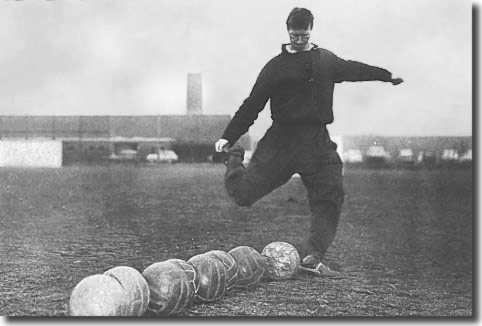 struggled
to find a manager. As a side struggling in the depths of Division Two,
it would be doubly difficult to do so.
struggled
to find a manager. As a side struggling in the depths of Division Two,
it would be doubly difficult to do so.
Bagchi and Rogerson: 'In reality, therefore, the Leeds board had little
choice but to take the radical option and appoint Revie. Mired in the
lower half of the Second Division, they were palpably less marketable
to the ambitious or established manager than they had been two years previously.
After such a variety of managers and methods since the war, it was little
wonder that Eric Stanger in the Yorkshire Evening Post concluded:
"Nothing would benefit Leeds United more than a long stable period
of sound management. In fact, in their financial position, it is their
only hope for the future."
'Not only was Revie available, affordable and impressively full of ideas,
he was also, ideally, aware of the staff's shortcomings and the precariousness
of the club's standing at the bank. Crucially, he was far more likely
to accept the offer than any other candidate suited to the job.
'Three days after Crowther's erroneous prediction, the die was cast.
The thirty-three-year-old Revie was appointed on a three-year contract
- on terms markedly inferior to those that Taylor had enjoyed. His pay
was pegged at the £20 maximum, which had until recently been the maximum
wage. The Leeds Board were insistent that Revie should keep his 'playing'
contract for as long as possible. It was far cheaper that way. Desperate
to stay in football and singularly unsuited for the stock career route
of the ex-professional running a pub, Revie knew he had little option
but to agree. He never forgot their initial caution, hardly a brilliant
tactic to adopt with one so temperamentally vulnerable. In future, even
if their compromised position at the bank had given them little choice,
they would pay a heavy price for their attempt to screw him.'
A marriage made in heaven had an unpromising courtship.
Revie's first game involved a trip to struggling Portsmouth on 18 March.
The line-up in that first game read as follows: Alan Humphreys; Alf Jones,
John Kilford; Bobby Cameron, Freddie Goodwin, Peter McConnell; Gerry Francis,
Peter Fitzgerald, Jack Charlton, Biily Bremner, Colin Grainger.
Revie chose to spring a surprise by aping a decision of former Elland
Road boss Major Frank Buckley. Back
in the 1950s the Major had decided to experiment with centre half John
Charles in the forward line. Now Revie broke the news that his argumentative
centre half Jack Charlton would be asked to repeat the trick by wearing
the number nine shirt.
Charlton had often clashed with Revie since his arrival at Elland Road
in 1958 as a player, and the defender was apprehensive about the move:
'I tried my best, but the No 9 shirt didn't feel right to me. I didn't
know what to do, and nobody showed me. I remember Joe Shaw of Sheffield
United laughing at me, I was making such a mess of it. You are the wrong
way round up there. The ball comes to you when you have your back to the
goal and I prefer to be facing it.'
Despite all his reservations, Charlton somehow managed to get on the
scoresheet, hitting Leeds' goal in a disappointing 3-1 reverse. Revie
persevered with the experiment, only withdrawing Charlton when Goodwin
was unavailable. The manager also blooded a promising new talent on the
left wing.
back to top
The twenty-year-old black South African Albert
Johanneson, later to be christened the Black Flash, arrived at the
club in April after Revie was tipped off to his talents by a school teacher.
No transfer fee was involved, just the cost of transport from Johannesburg,
and the young winger joined his countryman Gerry Francis at Elland Road.
It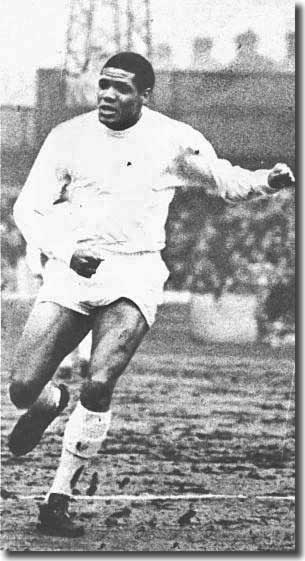 took only a couple of training sessions to convince Don Revie of the boy's
talents, and he was pitched into the first team. He was only a shadow
of the exciting talent he later became but did enough in a closing run
of five games to excite tremendous interest.
took only a couple of training sessions to convince Don Revie of the boy's
talents, and he was pitched into the first team. He was only a shadow
of the exciting talent he later became but did enough in a closing run
of five games to excite tremendous interest.
With Charlton managing a further four goals to add to the one he hit
at Portsmouth, Leeds squeezed enough points out of the final few games
to secure Leeds' Second Division status, even though the only win came
from an extraordinary 7-0 drubbing of already relegated Lincoln City.
Those two points were enough to end any lingering threat of relegation
with a couple of games remaining.
It had not been an auspicious start to a fledgling management career,
but Revie did well to get any return at all from an ailing and dispirited
squad. The Elland Road support were not impressed, however. The cynical
jeer of 'Here come the mugs' which drifted from the terraces was by no
means the harshest of the taunts the Leeds team suffered in this dreariest
of seasons - the final home match of the season against Scunthorpe United,
while not a major attraction could draw a crowd of just 6,975, the lowest
home attendance since 1934. There was much work to do if the hopes of
Revie and Harry Reynolds were to be realised, but at least the devastating
impact of two successive relegations had been avoided.
Other Football Highlights from 1960/61
- English football was only days away from its first national strike
when the Football League backed down in its long running dispute with
the PFA. The arguments over player's wages and the terms of their contracts
had dragged on for years. There was a maximum wage of £20 a week in
the season and £17 during the summer and players were not allowed to
move to a club of their choosing at the end of a contract. After five
hours of last ditch talks at the Ministry of Labour on January 18, the
League finally agreed to abandon the regulations
- The moment that the maximum wage was established Tommy Trinder, the
Fulham chairman, made Johnny Haynes the first £100 a week footballer
in England. That kept Haynes in England, but Italian clubs raided for
the best of British talent - Joe Baker moved from Hibs to Torino for
£73,000, Denis Law Manchester City to Turin £100,000, Jimmy Greaves
Chelsea to AC Milan £80,000 and Gerry Hitchens AC Milan to Inter Milan
£80,000
- England beat their bitterest rivals Scotland 9-3 on 15 April at Wembley,
with Jimmy Greaves scoring a hat trick and Bobby Smith and Johnny Haynes
both getting two
- Sir Stanley Rous was elected the president of FIFA. Denis Follows
replaced him as the secretary of the Football Association
- Everybody believed that the Double would never be achieved in modern
times, but Spurs and their cultured Irish captain Danny Blanchflower
did the impossible this year. Tottenham had a record breaking start,
winning their first 11 league matches and only dropped one point in
the first 16 games. They were so far ahead by Christmas that bookmakers
refused to take any more bets on them. They wrapped the title up on
17 April with three games still to go. Then they completed the job by
beating Leicester City 2-0 at Wembley to win the FA Cup
- Rangers reached the final of the inaugural European Cup Winners' Cup
before losing 4-1 on aggregate to Italy's Fiorentina. The Glasgow club
did manage to win the Scottish championship and the Scottish League
Cup, however
- Peterborough in their first season in the league raced through the
Fourth Division and were promoted as champions, scoring a record 134
goals. Terry Bly was their leading marksman with 52 goals, a post-war
record
- Real Madrid's perfect European Cup record was ended and Portugal's
Benfica beat Barcelona 3-2 in the final












 Relegation
is never a pleasant experience for anybody, but Leeds United manager Jack
Taylor found it particularly hard in 1960
when, within a year of him taking over at Elland Road, the club lost their
First Division status. He felt let down by the players and decided that
drastic action was called for if the club were to recover their top flight
status quickly.
Relegation
is never a pleasant experience for anybody, but Leeds United manager Jack
Taylor found it particularly hard in 1960
when, within a year of him taking over at Elland Road, the club lost their
First Division status. He felt let down by the players and decided that
drastic action was called for if the club were to recover their top flight
status quickly. the
fundamentals of fitness in his wartime service with the Reconnaissance
Regiment in France after D-Day. He was temperamentally and professionally
qualified for the position of trainer. One of the first generation to
take the FA Coaching Certificate, he supplemented his tactical acumen
with exploratory studies in physiology and, more unusually, also dabbled
in the avant-garde sports sciences of kinesiology and biomechanics. He
had a stormy start with his new charges, who were contemptuous of his
dedication to their development, and had many a run-in with that self-styled
'one man awkward squad', Jack Charlton. Yet barely a year after joining
Leeds, he was summoned to Lancaster Gate and offered the prestigious job
of putting England squads through his revolutionary sequence of sadistic
drills, a position he was to occupy from 1966 right through to 1977.
the
fundamentals of fitness in his wartime service with the Reconnaissance
Regiment in France after D-Day. He was temperamentally and professionally
qualified for the position of trainer. One of the first generation to
take the FA Coaching Certificate, he supplemented his tactical acumen
with exploratory studies in physiology and, more unusually, also dabbled
in the avant-garde sports sciences of kinesiology and biomechanics. He
had a stormy start with his new charges, who were contemptuous of his
dedication to their development, and had many a run-in with that self-styled
'one man awkward squad', Jack Charlton. Yet barely a year after joining
Leeds, he was summoned to Lancaster Gate and offered the prestigious job
of putting England squads through his revolutionary sequence of sadistic
drills, a position he was to occupy from 1966 right through to 1977. Goodwin
remained in the centre of defence, with Bremner and Revie in tandem on
the right and big John McCole leading the line.
Goodwin
remained in the centre of defence, with Bremner and Revie in tandem on
the right and big John McCole leading the line. just
25 seconds remaining Reeves crowned a personal triumph by netting his
fifth in an amazing game which went on until 10.10pm because of two floodlight
failures, making it the longest-ever match in England.
just
25 seconds remaining Reeves crowned a personal triumph by netting his
fifth in an amazing game which went on until 10.10pm because of two floodlight
failures, making it the longest-ever match in England. in the league, winning five of their eight games and climbing to ninth
in the table from a lowly fifteenth spot.
in the league, winning five of their eight games and climbing to ninth
in the table from a lowly fifteenth spot. struggled
to find a manager. As a side struggling in the depths of Division Two,
it would be doubly difficult to do so.
struggled
to find a manager. As a side struggling in the depths of Division Two,
it would be doubly difficult to do so. took only a couple of training sessions to convince Don Revie of the boy's
talents, and he was pitched into the first team. He was only a shadow
of the exciting talent he later became but did enough in a closing run
of five games to excite tremendous interest.
took only a couple of training sessions to convince Don Revie of the boy's
talents, and he was pitched into the first team. He was only a shadow
of the exciting talent he later became but did enough in a closing run
of five games to excite tremendous interest.